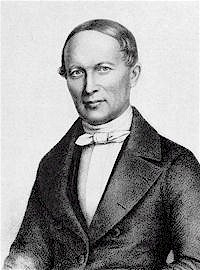























| Born: June 27, 1789, Schnait im Remstal, Germany (near Stuttgart). Died: August 26, 1860, Tübingen, Germany. Buried: Tübingen, Germany. In 1912, Silcher’s birthplace, the old school building in Schnait im Remstal, became a museum and memorial to him. |  |
Silcher’s father died when he was four years old, and his mother married Christian Heinrich Wegmann, the local schoolteacher. Wegmann was a faithful and loving stepfather, and Friedrich was his special darling.
Silcher’s schooling ended at age 14, and he wanted to become a teacher. At that time, training involved a three year apprenticeship with a master schoolteacher (Schulmeister), so Silcher became an assistant teacher in Geradstetten, Remstal. His Schulmeister was not only a teacher, but also a renowned choirmaster, which influenced Silcher’s future development.
In 1806, when his apprenticeship was finished, Silcher became assistant teacher in Fellbach, near Stuttgart. From 1809 on, he taught school in Ludwigsburg, where he met composers Carl Maria von Weber and Konradin Kreutzer. Both encouraged him to make music his profession.
While in Ludwigsburg, Silcher also came into contact with the ideas of Swiss teacher Heinrich Pestalozzi. Pestalozzi advocated universal education, and using music and singing as an educational tool. In Switzerland, Hans Georg Nägeli tried to put Pestalozzi’s ideas into action: he founded numerous choral societies, mainly male (Männergesangverein). Nägeli’s ideas greatly influenced Silcher. They corresponded with and visited each other frequently. Silcher highly admired Nägeli, and his letters referred to him as “My dearest friend and patron.” (Once he wrote to Nägeli that Nägeli was a hero and knight of singing, and he, Silcher, was his squire.)
In 1815, Silcher moved to Stuttgart to become a musician and music teacher. One of his mentors was composer Konradin Kreutzer, director of the Würtemberg Court Chapel. Silcher lived with the family of the piano manufacturer Schiedmayer.
In 1817, Silcher became Music Director at the University of Tübingen, where he stayed the rest of his life. In Tübingen, Silcher founded the Akademische Liedertafel (University Singing Society) in 1829, and was its president for over 30 years. In 1852, the University made him Doctor Philosophiae honoris causa, highest of his many honors.
To give newly formed choral societies something to sing, Silcher collected, composed and edited hundreds of folk songs, tunes, and hymns, and wrote settings and arrangements for choir and home singing. One of the best known, by Silcher himself, was Ich weiß nicht, was soll es bedeuten, the “Loreley” song (words by Heinrich Heine, 1823). Silcher published the melody in 1838, but may have written it somewhat earlier.
In 1825 and 1828, Silcher edited Vierstimmige Hymnen und Choralgesänge (Hymns for Four Voices). In 1846, he edited a collection of 62 hymns for two or three voices (“arranged for school, church and home use”). He was also a pioneer in rediscovering sacred music by 16th and 17th century composers, such as Hassler, Palestrina, Praetorius, and Bach. He wrote a Geschichte des evangelischen Kirchengesangs (History of Protestant Church Singing).
Music:
The Blue Letter Bible ministry and the BLB Institute hold to the historical, conservative Christian faith, which includes a firm belief in the inerrancy of Scripture. Since the text and audio content provided by BLB represent a range of evangelical traditions, all of the ideas and principles conveyed in the resource materials are not necessarily affirmed, in total, by this ministry.
Loading
Loading
| Interlinear |
| Bibles |
| Cross-Refs |
| Commentaries |
| Dictionaries |
| Miscellaneous |
